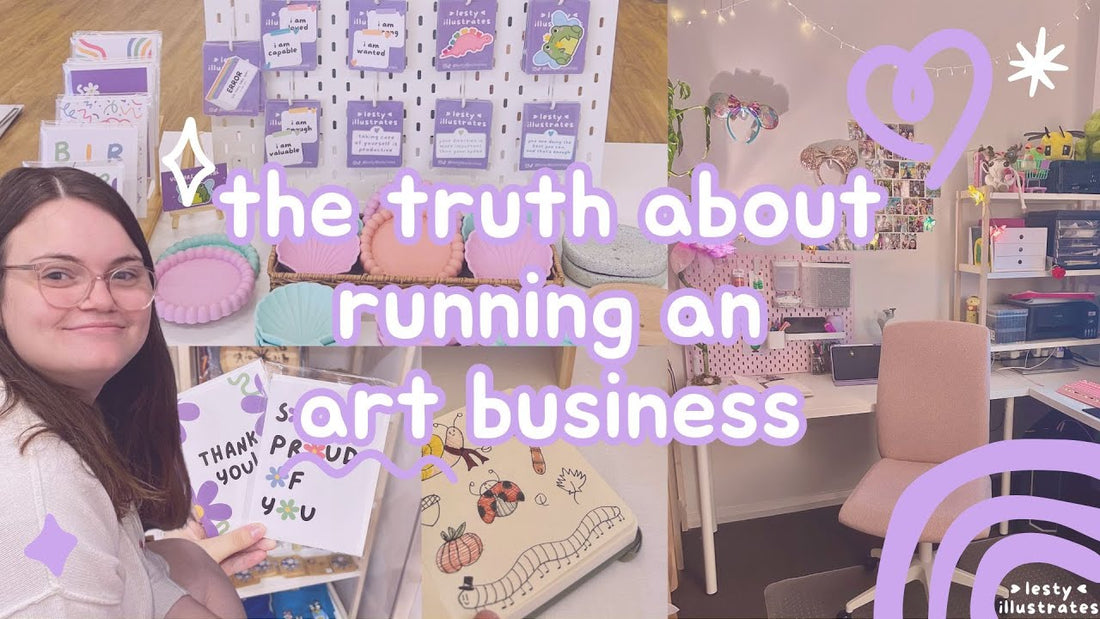
7 Truths About Running an Art Business
Hey friends! Welcome to my blog ✨
I wanted to talk today about some important truths about running a small art business. After working on Lesty Illustrates for close to a year now, I feel its a good time to reflect + share some of the advice & tips i've picked up along the way.
If you'd rather listen & watch this blog instead of reading it, you can watch the YouTube video here.
So without further ado, here are the 7 most important truths about running a small art business (plus some bonus tips too).
1. Your energy is your most valuable resource — not your time
Everyone talks about time management. But here’s the thing — if you have no energy, the time is useless.
I’ve had days where I’ve set aside six hours for drawing, and… I spent all six hours lying on the couch staring at my pencil because my brain and body were just done.
If you’re neurodivergent or dealing with chronic illness, it’s about energy pacing. For me, that means working in bursts when I feel good, and forgiving myself when I need rest — even if that “rest day” happens to fall on a day I’d planned to be productive.
Your to-do list should serve you, not the other way around.
2. Creativity isn’t infinite
I used to think my creativity was a never-ending tap. I’d just… turn it on, right? Nope.
When you’re living with mental health fluctuations, creativity is one of the first things to go. And pushing through can actually make it worse.
I’ve had periods where the most I could manage was doodling aimless little blobs — and that was enough. Sometimes, the best thing you can do for your creativity is to let it breathe. Watch your favourite show, draw for fun with zero expectations, or take in other people’s art without comparing yourself.
3. Admin work takes more time than drawing
This one shocked me.
Some weeks, I spend more time packing orders, updating my website, answering emails, and making social posts than actually making art.
And for neurodivergent brains, admin isn’t just “a small task.” It can feel like climbing a mountain in flip-flops. I’ve had emails sit in my inbox for a week just because my brain couldn’t switch gears into “business mode.”
I batch tasks where I can — like a whole afternoon for packing, or one block of time to schedule posts for the week. It’s not perfect, but it keeps my brain from constantly switching between “creative” and “admin” mode.
4. Self-promotion is emotionally draining
I can happily show my art to friends, but the minute I have to “sell” it? My brain is like, ugh, no thanks.
If you’re dealing with rejection sensitivity, low engagement can feel like a personal failure. It’s not — it’s just how algorithms work.
I try to reframe marketing as storytelling rather than sales. I’m not saying “please buy my art”; I’m saying “here’s the world I built, and you’re welcome to be part of it.” That shift has saved me a lot of emotional energy.
Bonus Truth #1: Not every day will feel creative — and that’s normal
Some days, the “work” of being an artist isn’t art at all. And that doesn’t make you any less of an artist.
5. Pricing your work feels like emotional calculus
There’s the maths: materials + time + overheads = price.
But then there’s the brain: What if it’s too expensive? What if no one buys it? What if people think I’m greedy?
And if you live with disability or mental health challenges, there’s often this invisible pressure to “prove” your worth — which makes undercharging way too tempting.
My advice? Price your work for sustainability, not survival. Your business won’t last if you’re constantly burning out or barely covering costs.
6. Boundaries are essential — and harder than you think
Especially when you’re running a small business, it’s tempting to say yes to everything: commissions, collaborations, events.
But overcommitting when your health is unpredictable can lead to a crash. I’ve had entire weeks wiped out because I agreed to “just one more” project.
Now, I have hard limits. I cap my commissions. I give longer delivery timelines than I think I’ll need. And I try to remember: every “yes” to something else is a “no” to my rest time.
Bonus Truth #2: Your worth isn’t tied to your productivity
This one’s for my fellow neurodivergent perfectionists — you are more than what you make.
7. You’re allowed to build your business around your needs
I used to feel like I had to follow every “10 steps to success” guide. Post daily, launch big collections, go to every market.
But honestly? My business works better when I build it to fit me.
Smaller product drops mean less overwhelm. Flexible posting schedules mean I can create when I have capacity. Outsourcing shipping for certain products gives me energy back for drawing.
You don’t have to earn your rest by overworking first.
